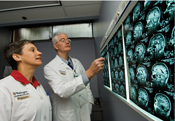 John C. Morris, MD, leads the world-renowned Alzheimer’s Disease Research Center at Washington University School of Medicine. John C. Morris, MD, leads the world-renowned Alzheimer’s Disease Research Center at Washington University School of Medicine. |
Serious memory loss or dementia is not a part of normal aging. When memory loss starts to affect daily life, you may need to be referred to the Memory Diagnostic Center. We evaluate people who may have a memory disorder, as well those who have problems with thinking, language or behavior. We work with patients and their families to provide therapy, slow the disease process and to make necessary lifestyle arrangements.
Barnes-Jewish & Washington University neurologists and neurosurgeons are leaders in the treatment and research of Alzheimer’s disease and related memory disorders. Our studies into the causes, symptoms and onset of Alzheimer’s disease translate into more successful treatments for our patients – and hope for an eventual cure.
UNDERSTANDING MEMORY LOSS AND DEMENTIA
The most common cause of dementia in older people is Alzheimer’s disease. But there are other brain disorders that can also cause dementia, including stroke, frontotemporal dementia, Lewy body disease and other conditions that affect the memory and thinking portions of the brain. Other causes of cognitive impairment can include depression, drug interactions and thyroid problems. These can be reversible if detected early.
Signs of loss of memory and thinking abilities include:
- Gradual decline of memory
- Decreased ability to perform routine tasks
- Decline in clear thinking
- Problems with judgment and reasoning
- Confusion, getting lost easily
- Depression, anxiety or hallucinations
Early detection of dementia allows the patient to begin therapy designed to slow down the progression of memory and cognitive loss. Although there is no cure for most types of dementia, drug treatment may improve symptoms and enhance quality of life.
WHAT TO EXPECT
There is no single test to diagnose dementia. At the Memory Diagnostic Center, the diagnosis is made by reviewing the patient history, giving a complete physical and neurological exam, and assessing memory and thinking skills with paper and pencil tests. Additional testing may be ordered at the time of the first visit.
Every effort is made to finish the initial patient evaluation during one appointment. Patients are seen by a full team, including a physician, trained nurse practitioner and psychometrist, all working together to diagnose and develop a treatment. For the first appointment, patients are asked to bring another person with them who can help answer questions, such as a spouse, friend or caregiver.
Clinical studies are available for patients interested in volunteering.
For a referral to a Washington University neurologist or neurosurgeon at Barnes-Jewish Hospital, call 888.998.3841.